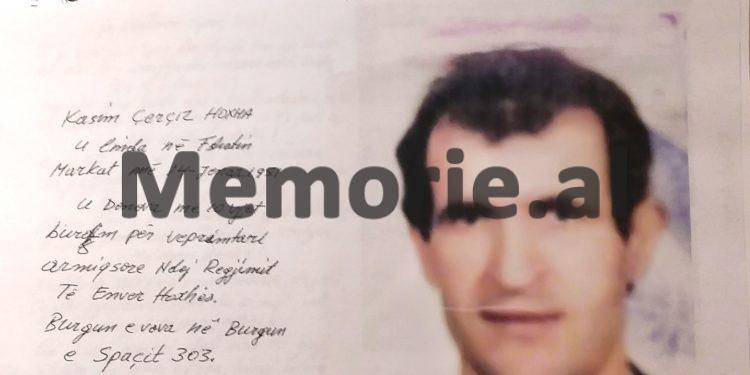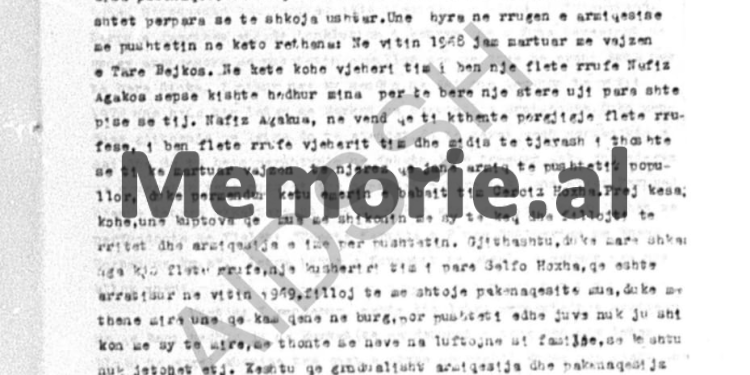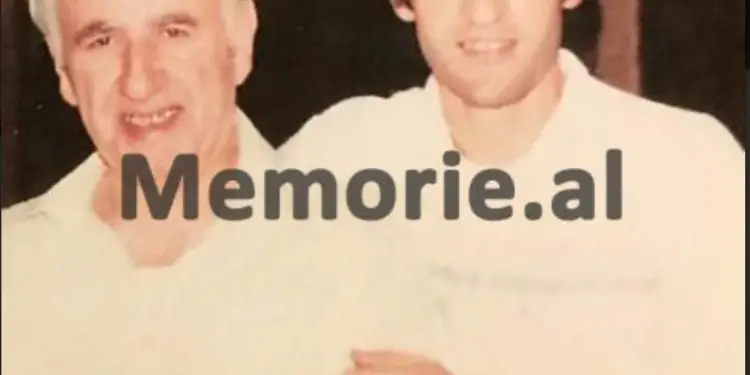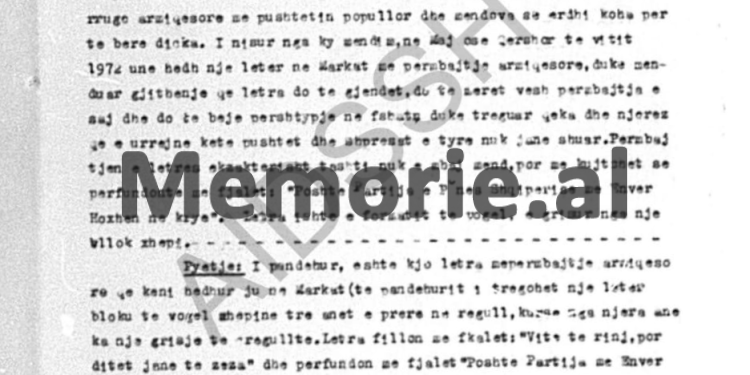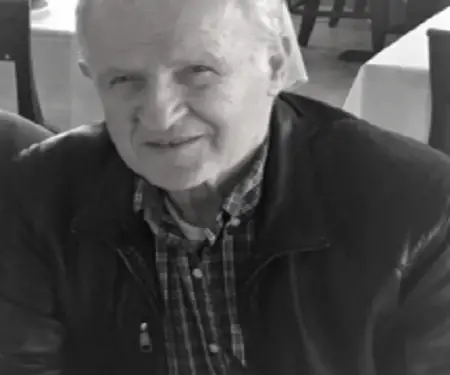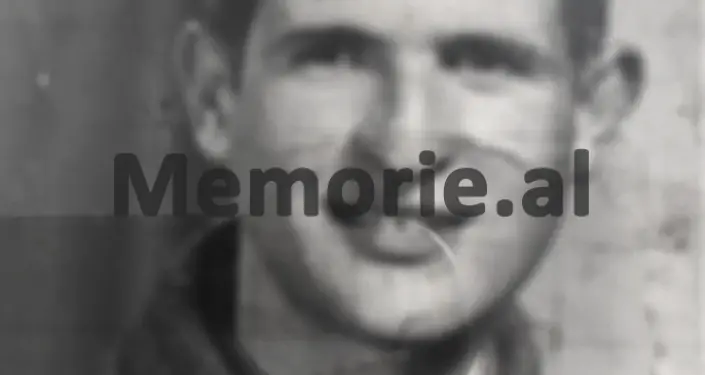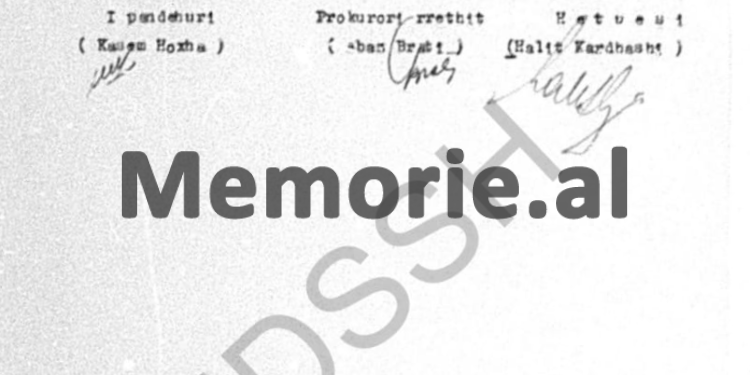Dashnor Kaloçi
The sixth part
Memorie.al publishes a file that was obtained some time ago by the institution of the Authority for the Information of Files of the former State Security, where the investigative, judicial and processing file of the citizen Kasëm Hoxha, originally from the village of Markat in Saranda and residing in the USA since 1985, when he was able to escape from Albania to Greece, after having suffered ten years in the Spaçi camp, convicted of “agitation and propaganda against popular power”. At the time of his arrest, on June 21, 1973, by the State Security bodies, of the Internal Affairs Branch of the Saranda district, some “compromising materials”, such as poems and tracts, were found in his house , where he called “for the overthrow of popular power”, etc. The file in charge of the citizen Kaso Hoxha, (now de-classified) begins with the processing, where the State Security bodies and the Department of Internal Affairs of the district of Saranda make every effort to find the author of the letter. with deep hostile content”, which was thrown in the center of Markat village (with residents of the Cham community), where after a long time, with the help of the Central Criminal Laboratory, near the Ministry of Internal Affairs in Tirana, it became possible, in order to clarify and identify that the writing on that letter was Kaso Hoxha’s, this also led to his arrest. The file in question continues with the investigative and judicial process against him, where he, after suffering ten years in Spaçi prison, in November 1982 returns to his native village, Markat, where from the first days, he was followed and monitored. by the bodies of the State Security, who had engaged not only some associates of the Security, but also his close family members, this forced Kaso, to escape arrest, to escape from Albania, crossing the state border, to the state neighbors, Greece. After some time staying in the Llavros Camp, he gained the status of a political asylum seeker, to go to the United States of America, where even there, he continued to be followed and monitored by the State Security bodies (Albanian Political Intelligence, which was camouflaged with his residency, near the Diplomatic Mission in the United Nations Organization) and some of its secret agents, until 1991, when the communist regime in Albania collapsed. The story of Kaso Hoxha, became known after the publication of his book “Beautiful land, ugly people”, which he entrusted to Memorie.al in manuscript, now comes through the documents of the State Security, (where they are, reports of collaborators of the State Security, with their pseudonyms, letters, notes, information, relations, report-information, interceptions with operational techniques, etc., of the officers of the State Security, investigators, holders of the Department of Internal Affairs, of the district of Saranda, etc., to the residency of Political Intelligence in the USA, and its agents there), which begin in 1973 and end in 1991, when his file was archived once and for all.
Continues from last issue
The document with the minutes of the interrogation of Kaso Hoxha, by the investigator of the Department of Internal Affairs of the district of Saranda, Halit Kardhashi, in the presence of the district prosecutor
Verbal Process
In Saranda, on 14/VIII/1973
I, the investigator of the Internal Affairs Branch, Halit Kardhashi, interrogated the defendant Kasem Çerçiz Hoxha.
Question: Explain to us once again everything about the accusation against you?
Answer: As I have explained before, driven by several different grievances, I have come to hate this power before it goes soldier. I entered the path of enmity with power under these circumstances. In 1968, I married Tara Bejko’s daughter. At this time, my father-in-law made lightning strikes against Nafiz Agako, because he had laid mines to make a water ster in front of his house.
Nazif Agakua, instead of replying to the letter-lightning, made a letter-lightning to my father-in-law and among other things told him that: you married the daughter of people who are enemies of the people’s power, mentioning here the name of my father, Çerçiz Hoxha. From that time on, I realized that I was looked down upon and my hostility towards the authorities began to grow.
Also, taking the trigger from this letter-lightning, one of my first cousins, Selfo Hoxha, who escaped in 1969, began to add to my displeasure, saying to me: well I have been in prison, but to the power and to you he doesn’t look at you kindly, he told me that they fight us as a family, that this is not the way to live, etc. So gradually the enmity and dissatisfaction with the government was growing.
In the army, I remember that even though I was not in the meeting, I was proposed as youth secretary, but as a friend of mine from Grava, Thoma Miçoni, told me, one of my villagers, Guxim Dine, stood up and made a biography of me, saying that there are fugitives; as a result, I was removed from the list.
In the army, Thoma Miçoni asked me who these escaped cousins were, I told him, among others, that a first cousin of mine, Selfo Hoxha, escaped, I told him about the persistent efforts to discover the passable places that done by Selfo Hoxha.
Every time they came and worked on the border line and I don’t remember praising the gesture of their escape, as Thomai told me in the confrontation, but I only told him about the observations that Selfua made when he went to work on the border . After being released from the army, I returned to the village and started working as a member of the Cooperative.
In February 1972, I bought a radio. Looking for different stations, I came across the Radio-Moscow station in the Albanian language and listened to it regularly. From the systematic listening of Radio-Moscow and from the dissatisfactions and sufferings I had, I became even more convinced that the path our party is following is wrong, and that is why I hated it.
I also listened to other stations, such as Prishtina, “Voice of America”, etc. As a result of this, I became completely hostile to the people’s power, and I thought it was time to do something.
Starting from this thought, in May or June of 1972, I drop a letter in Markat, with hostile content, always thinking that the letter will be found, its content will be known and I would make an impression on the village, showed that there are also people who hate this power and their hopes are not extinguished.
I don’t remember the exact content of the letter now, but I remember that it ended with the words: “Down with the Labor Party of Albania, with Enver Hoxha at the head”. The paper was of small format, torn from a pocket pad.
Question: Defendant is this letter with hostile content that you dropped in Markat, (the defendant is shown a small pocket pad letter, three sides neatly cut, and on one side, there is an irregular tear. The letter begins with the words: “New year’s, but the days are black”. And it ends with the words: “Down with the Party with Enver Hoxha at the head”. On the other side of the letter, inside an oval-shaped drawing, it is written: “Glory to our group led by comrades T. Sejko, T. Demi”).
Answer: Yes, the letters that I dropped in the Brands area with hostile content, starting with the words “New year’s, but the days are dark”. And it ends with the words: “Down with the Party with Enver Hoxha at the head”, which you are telling me now, is exactly what I threw in the village. The writing is mined, written in lead pencil.
Question: On the back page of this letter, there is an oval drawing where it is written: “Glory to our group led by comrades T. Sejko, T. Demi”. Explain what this means?
Answer: On the back of the pad, inside a wreath of drawn flowers, I wrote: “Glory to our group led by comrades T. Sejko, T. Demi”, in order to show that even though they were killed, we have respect for them. I also wanted to show the people that Teme Sejkua and Tahir Demi no longer live; their group exists, with the aim that, as I said before, it would have an effect on the people.
Question: Defendant, is this your pad that we are showing you (defendant is shown a small pocket notepad, purple ink, with slang at the beginning and end)?
Answer: Yes, the block shown to me, the old one is mine and as far as I can remember, I lost it.
Question: On one of the sheets of the pad, which is folded and exactly on the last sheet that is written, there is this note: “The signs, they showed me. What am I doing that I’m still here”. Is this your writing?
Answer: Yes, this is my writing.
Question: What did you mean by this note?
Answer: I wrote this word at the moment when my mind was filled with the fact that the letter had fallen into the hands of the Security authorities, that’s why I express this concern as well.
Question: Do you have anything else to say about the charge?
Answer: I have nothing else to say about the accusation, the explanations I gave today are true. I’m sorry that at the beginning when I was questioned by the investigator, I didn’t tell the real reason, because I had compiled this letter and threw it in the village. The truth is that I threw the letter in the village, starting from the enmity I have for the People’s Power, to show others that there are also opponents of this power, and we, its opponents, have not lost hope.
Question: Do you have anything to say about the investigative process, do you have any evidence to look for that you think is in your favor?
I answer: I have nothing to ask, to expand the investigation, I have no remarks about the investigation, my statements have always been written correctly and I know that I am guilty of this power.
After reading the process and seeing that my statements were written correctly, I signed it.
Defendant Investigator
Kaso Hoxha Halit Kardhashi
District Attorney
Abaz Brati
The document compiled by the investigator Halit Kardhashi and approved by the district prosecutor of Saranda, Abaz Brati, with the decision to indict Kasëm Hoxha
THE PEOPLE’S REPUBLIC OF ALBANIA
MINISTRY OF INTERIOR AFFAIRS APPROVED
INTERNAL AFFAIRS DEPARTMENT DISTRICT PROSECUTOR
No. 43 (ABAZ BRATI)
ACT – ACCUSATION
Against the defendant Kasem Çerçiz Hoxha, accused of having developed agitation and propaganda against popular power, which is provided as a crime by article 73/1 of the Criminal Code.
On May 21, 1973, the Security Bodies of the Sarandë Interior Branch were informed that on May 20, 1972, in the center of the Markat district, an anonymous letter with deeply hostile content was found. From the measures taken to discover the author of this letter and especially from the expert report, it was proven that its author was Kasem Çerçiz Hoxha, and from Markat township. On this basis, on June 14, 1973, the criminal case began against the above-mentioned person under arrest.
From the development of the investigations, it turned out that: The defendant Kasem Çerçiz Hoxha, starting from 1968, from time to time has shown various dissatisfactions against the popular power and over time, especially during 1969, as a result of several conversations of a hostile nature that he developed with his cousin Selfo Hoxha, who in August 1969, escaped to Greece, Kasemi was completely put in hostile positions with the Party and the People’s Power in our country.
The defendant Kasem Hoxha, at the end of 1969, was called up to perform military service. Even there, in conversations with the witness Thoma Miçoni, he praised the act of treason against the country committed by his first cousin Selfo Hoxha and other fellow villagers, Bilal Xhaferi and Bajram Shuaipi, expressly telling him that they did well to be escaped, that Selfua also took with him his brother-in-law, Bilal Xhaferi, that although the latter was a very good writer, his works were unfairly rejected.
After his release from the army and his arrival in the village of Markat, the defendant Kasem Hoxha increased his hostile activity against the popular government, in the form of agitation and propaganda. Being predisposed to the hostile path, especially after February 1972, when the defendant buys a radio, he becomes a regular listener of the stations of capitalist-revisionist countries, especially Radio Moscow, “Voice of America”, and Radio Prishtina, others, for the programs they broadcast in the Albanian language.
The defendant Kasem Hoxha, as an enemy of popular power, inspired by the hostile propaganda of these radio stations and especially of Radio Moscow, takes more advanced actions in this activity. Thus, on May 20, 1972, after writing an anonymous letter in his home with a deeply hostile content, he threw it in the center of Markat village. In this letter he writes: “New year’s, but the days are black. With these few words, dear Albanians, I want to describe your countless sufferings. You could write a whole novel with this title. This time, brothers, can’t stand it. That’s why we all have to stand up to win our rights. I believe you understand me. Down with the Party with Enver Hoxha at the helm”.
On the other side of this letter, inside an oval painting, is written: “Glory to our group led by T. Sejko and T. Demin”.
From the very content of the anonymous letter and the depositions made to the investigator, the defendant Kasem Hoxha, through this letter with deep hostile content thrown in Markat township, had the purpose of instilling uncertainty in the existence of popular power in our country, to keep alive the hopes for a change in the situation in Albania and its occupation by the western powers, to tell the masses that; there are still people who hate the people’s power and their hopes have not been extinguished, because Teme Sejko and Tahir Demi have been killed, their work will live on, because there are still people who continue what these traitors of the homeland could not achieve etc.
With the presentation of the charge to the investigator, the defendant admitted that he has developed hostile activity in the form of agitation and propaganda, that he had written the letter with hostile content, but initially in his explanations he tried to present that he allegedly wrote this letter with hostile content, to test the attitude of the people who would find it, while later, the defendant admitted that he threw away the anonymous letter, based on the hostile intentions he described in the letter.
The defendant’s guilt is proven not only by his depositions made to the investigator, but also by the report-expertise No. 14 dated 8.9.1972, the statements of the witness Thoma Miçoni, as well as the original letter with hostile content, found in Marakat village.
The offense committed by the defendant is dangerous because it is directed against the People’s Republic of Albania, the Foreign Security and its defense force. The defendant himself is also dangerous, since the investigator tried to justify the true reasons for compiling and posting the letter with hostile content.
In these circumstances, we present for trial the defendant Kasem Hoxha, son of Çerçiz and Kane, born in 1951, born and resident in Markat village, educated (8 years old, farmer profession, married with children, Albanian nationality and citizenship , never convicted, who is Accused of:
That he has developed agitation and propaganda against popular power, which is provided as a crime by article 73/1 of the Criminal Code.
This indictment was compiled by me, Investigator Halit Kardhashi.
The investigator
Halit Kardhashi
The indictment was delivered to me today with the date_______ 1973. Memorie.al
The defendant
Kasem Hoxha
The next issue follows




